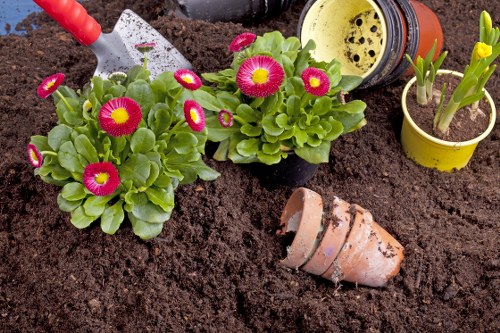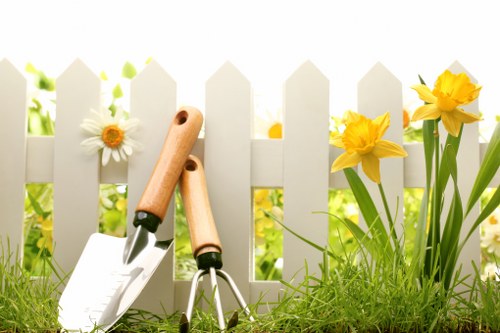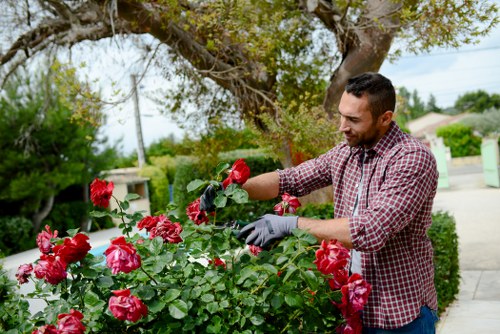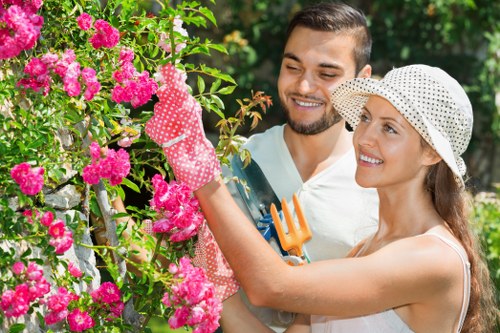Comprehensive Guide to Garden Maintenance in Tufnell Park
Introduction to Garden Maintenance

Maintaining a beautiful garden in Tufnell Park requires a combination of knowledge, dedication, and the right tools. Whether you're a seasoned gardener or a beginner, understanding the essentials of garden upkeep can transform your outdoor space into a vibrant and inviting area.
Garden maintenance involves various tasks, including planting, pruning, weeding, and lawn care. Each of these elements plays a crucial role in ensuring your garden remains healthy and aesthetically pleasing throughout the year.
In Tufnell Park, the unique climate and soil conditions influence the types of plants that thrive. Adapting your maintenance practices to suit these local factors can significantly enhance the success of your gardening efforts.
Seasonal Garden Care

Spring Maintenance
Spring is the perfect time to rejuvenate your garden. Start by clearing out any debris accumulated over the winter months. Early spring is ideal for planting new flowers and vegetables, as the soil begins to warm up.
Pruning damaged branches and trimming shrubs can promote healthy growth. Additionally, applying a balanced fertilizer will provide the necessary nutrients for your plants to flourish.
Regular weeding is essential to prevent unwanted plants from competing with your garden's flora. Mulching can help retain soil moisture and suppress weed growth.
Summer Care
During the summer, consistent watering is paramount. Early morning or late evening watering reduces evaporation and ensures that plants receive adequate hydration.
Deadheading spent flowers encourages continuous blooming. It's also a good time to monitor for pests and diseases, addressing any issues promptly to prevent widespread problems.
Maintaining your lawn by mowing regularly and aerating the soil can keep it lush and green throughout the hot months.
Pruning and Trimming Techniques

Understanding Plant Needs
Different plants require specific pruning techniques to thrive. For instance, fruit trees benefit from annual pruning to shape the branches and improve fruit production.
Flowering shrubs may need selective trimming to remove dead or diseased parts, promoting healthier growth and more vibrant blooms.
It's important to use sharp, clean tools to make precise cuts, minimizing stress to the plants and preventing the spread of diseases.
Lawn Maintenance
A well-maintained lawn enhances the overall appeal of your garden. Regular mowing, watering, and fertilizing are key components of effective lawn care.
Overseeding in the fall can help fill in bare spots and improve the density of your turf. Additionally, controlling lawn pests and diseases ensures a healthy and resilient lawn.
Proper mowing height varies depending on the type of grass. Adjusting the mower accordingly can promote deeper root growth and better drought resistance.
Pest and Weed Control

Integrated Pest Management
Effective pest control involves a combination of strategies to manage unwanted insects and animals. Introducing natural predators, such as ladybugs and birds, can help keep pest populations in check.
Using organic pesticides when necessary minimizes the impact on beneficial insects and the environment. Regular monitoring allows for early detection and swift action against infestations.
Maintaining plant health through proper watering and nutrition makes them more resistant to pests and diseases.
Weed Management
Weeds compete with your garden plants for nutrients and water. Hand-pulling, mulching, and applying herbicides are common methods for controlling weed growth.
Preventative measures, such as laying landscape fabric and maintaining a thick mulch layer, can reduce the emergence of weeds.
Consistent maintenance is essential to keep weeds from becoming overwhelming and disrupting the balance of your garden.
Soil Health and Fertilization

Soil Testing and Preparation
Healthy soil is the foundation of a thriving garden. Conducting a soil test helps determine its pH level and nutrient content, guiding appropriate amendments.
Adding organic matter, such as compost or well-rotted manure, improves soil structure, fertility, and water retention.
Proper soil preparation before planting ensures that your plants have the best possible conditions to establish and grow.
Fertilizing Practices
Choosing the right fertilizer depends on your garden's specific needs. Balanced fertilizers provide essential nutrients, while specialized blends address particular deficiencies.
Applying fertilizer at the correct times, such as during the growing season, maximizes its effectiveness and supports robust plant growth.
Over-fertilization can harm plants and the environment, so it's important to follow recommended application rates and guidelines.
Tools and Equipment for Garden Maintenance
Essential Gardening Tools
Having the right tools makes garden maintenance more efficient and enjoyable. Basic tools include gloves, pruners, a trowel, a spade, and a watering can.
Investing in high-quality tools ensures durability and ease of use, reducing the risk of injury and making tasks more manageable.
Regular maintenance of your tools, such as cleaning and sharpening, extends their lifespan and performance.
Advanced Equipment
For larger gardens, additional equipment like lawnmowers, hedge trimmers, and irrigation systems can streamline maintenance tasks.
Automated watering systems help conserve water and provide consistent hydration for your plants, especially during busy periods.
Choosing energy-efficient and eco-friendly equipment supports sustainable gardening practices and reduces your environmental footprint.
Landscaping Ideas for Tufnell Park Gardens
Plant Selection
Selecting the right plants is crucial for creating a harmonious and resilient garden. Native plants are well-adapted to local conditions and require less maintenance.
Incorporating a mix of perennials and annuals adds variety and ensures continuous blooms throughout the seasons.
Consider the mature size of plants to prevent overcrowding and maintain a balanced landscape.
Design and Layout
A well-designed garden layout enhances both functionality and beauty. Pathways, seating areas, and focal points like fountains or sculptures add interest and usability.
Using raised beds or vertical gardening techniques can maximize space and improve plant accessibility.
Balancing colors, textures, and plant heights creates a visually appealing and cohesive garden environment.
Sustainable Gardening Practices
Water Conservation
Implementing water-saving techniques helps preserve this vital resource and promotes environmentally friendly gardening. Drip irrigation systems deliver water directly to plant roots, minimizing evaporation.
Collecting rainwater in barrels provides a natural and cost-effective water source for your garden.
Planting drought-tolerant species reduces the need for frequent watering and supports sustainable garden management.
Composting and Recycling
Composting kitchen scraps and garden waste recycles nutrients back into the soil, enhancing its fertility and structure.
Using recycled materials for garden structures, such as trellises and planters, promotes eco-friendly practices and reduces waste.
Implementing these sustainable methods contributes to a healthier garden and a greener environment.
Professional Garden Maintenance Services
Benefits of Hiring Experts
Engaging professional garden maintenance services in Tufnell Park ensures that your garden receives expert care and attention. Experienced gardeners can address specific challenges and implement tailored solutions.
Professional services offer comprehensive maintenance packages, including regular upkeep, seasonal planting, and emergency care.
Outsourcing garden maintenance frees up your time, allowing you to enjoy your outdoor space without the hassle of daily upkeep.
Choosing the Right Service Provider
When selecting a garden maintenance service, consider factors such as experience, reputation, and range of services offered. Reading reviews and seeking recommendations can help identify reliable providers.
Ensure that the service provider understands your vision and can customize their offerings to match your garden's unique needs.
Transparent pricing and clear communication are essential for establishing a positive working relationship with your gardener.
DIY Garden Maintenance Tips
Creating a Maintenance Schedule
Establishing a regular maintenance schedule helps keep your garden in top condition. Allocate specific times for tasks such as watering, weeding, and pruning to stay organized and consistent.
Using a gardening planner or digital app can assist in tracking your maintenance activities and ensuring that no tasks are overlooked.
Adjust your schedule based on seasonal changes and the specific needs of your plants.
Budget-Friendly Maintenance Solutions
Maintaining your garden doesn't have to be expensive. Utilizing homemade compost, repurposing household items for gardening, and choosing cost-effective plants can keep expenses low.
Taking advantage of free resources, such as local gardening workshops and online tutorials, can enhance your skills without additional costs.
By prioritizing essential tasks and making smart choices, you can achieve a beautiful garden on a budget.
Common Garden Maintenance Challenges
Dealing with Pests
Pests can pose a significant threat to your garden's health. Identifying common pests in Tufnell Park and implementing effective control measures is vital for protecting your plants.
Using natural repellents and encouraging beneficial insects can reduce pest populations without harming the environment.
Regular inspections and early intervention help prevent minor issues from escalating into major infestations.
Managing Plant Diseases
Plant diseases can disrupt the balance of your garden ecosystem. Understanding the signs of common diseases and taking preventative steps can maintain plant vitality.
Practicing good sanitation, such as removing infected plant material, reduces the spread of diseases.
Applying appropriate treatments and maintaining plant health through proper care enhances resistance to diseases.
Enhancing Garden Aesthetics
Incorporating Water Features
Water features like ponds, fountains, or birdbaths add a serene and dynamic element to your garden. They attract wildlife and create a soothing ambiance.
Choosing energy-efficient and low-maintenance water features ensures long-term enjoyment without excessive upkeep.
Strategically placing water elements can enhance the visual flow and focal points within your garden space.
Lighting and Decorations
Outdoor lighting highlights key features and extends the usability of your garden into the evening hours. Solar-powered lights are an eco-friendly option that reduces energy consumption.
Decorative elements such as statues, garden art, and decorative pots personalize your garden and reflect your individual style.
Balancing functional lighting with decorative accents creates an inviting and visually appealing outdoor environment.
Maintaining Garden Paths and Structures
Pathway Maintenance
Garden paths provide structure and accessibility, guiding visitors through your outdoor space. Regular maintenance, including weeding and repairing surface damage, keeps pathways safe and attractive.
Choosing durable and weather-resistant materials ensures that pathways withstand the elements and retain their appearance over time.
Incorporating gravel, stepping stones, or mulch can enhance the aesthetic appeal and functionality of your pathways.
Upkeeping Garden Structures
Garden structures such as sheds, pergolas, and trellises require regular maintenance to preserve their integrity and appearance. Inspecting for wear and tear, treating wood, and repainting when necessary prolongs their lifespan.
Properly maintaining structures ensures they continue to provide utility and enhance the overall design of your garden.
Integrating garden structures with the surrounding landscape creates a cohesive and harmonious outdoor space.
Conclusion and Next Steps
Achieving a Thriving Garden
Effective garden maintenance in Tufnell Park involves a combination of regular care, strategic planning, and a deep understanding of your garden's unique needs. By implementing the tips and practices outlined above, you can cultivate a beautiful and resilient garden that enhances your home's exterior and provides a peaceful retreat.
Embracing sustainable gardening methods not only benefits your garden but also contributes to the well-being of the broader community and environment.
Whether you choose to maintain your garden yourself or enlist the help of professional services, consistency and dedication are key to achieving long-term success.
Get Started Today
If you're ready to elevate your garden maintenance routine in Tufnell Park, don't hesitate to take the next step. Contact us today to learn more about our expert services and how we can help you create the garden of your dreams.